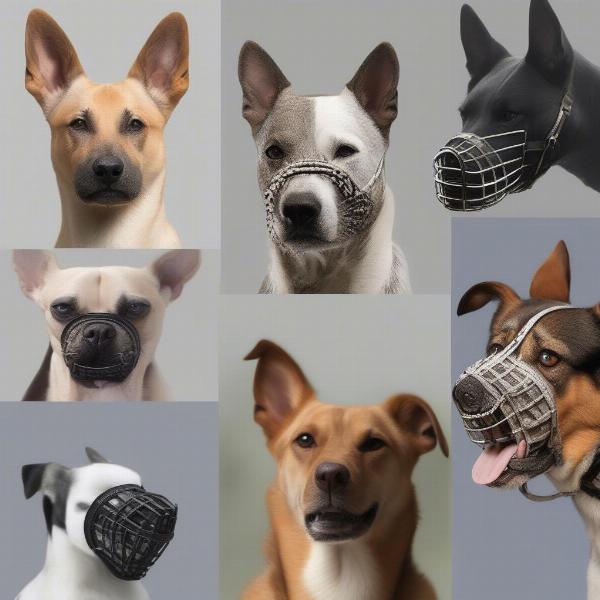Masks for dogs have become increasingly common, raising questions about their purpose and effectiveness. Are they a fashion statement, a necessary health precaution, or something else entirely? This guide explores the various types of dog masks, their uses, and what you need to know to make informed decisions about using them on your canine companion.
Why Use a Mask on a Dog?
Several reasons might lead owners to consider using a mask on their dog. These include:
- Protection from Airborne Irritants: Masks can help filter out dust, pollen, and other allergens that can irritate a dog’s respiratory system. This is particularly beneficial for dogs with allergies or sensitivities.
- Reducing the Spread of Disease: In certain situations, such as during outbreaks of canine influenza or kennel cough, masks can help reduce the spread of airborne pathogens.
- Post-Surgery Protection: Following certain surgical procedures, especially those involving the nose or mouth, a mask can help keep the area clean and prevent infection.
- Anxiety Reduction: For some anxious dogs, the gentle pressure of a muzzle or mask can have a calming effect. However, it’s crucial to use these tools correctly and under the guidance of a veterinarian or professional dog trainer.
- Safety During Grooming: While not strictly a mask, muzzles are sometimes necessary during grooming to prevent bites if a dog is fearful or uncomfortable.
Different Types of Dog Masks and Muzzles
It’s important to distinguish between masks and muzzles. While both cover a dog’s face, they serve different purposes.
Masks
- Cloth Masks: These are often used for protection against airborne irritants. They are typically washable and reusable.
- Disposable Masks: Similar to human surgical masks, these are single-use and offer a higher level of filtration.
- Specialized Masks: Certain masks are designed for specific purposes, such as filtering out smoke during wildfires or protecting against specific pathogens.
Muzzles
- Basket Muzzles: Allow for panting, drinking, and even treating, while preventing biting.
- Soft Muzzles: Made from fabric, these are less restrictive but offer less bite prevention.
- Short-Snouted Muzzles: Designed for brachycephalic breeds, these muzzles offer more breathing room.
 Different types of dog muzzles
Different types of dog muzzles
Choosing the Right Mask for Your Dog
Selecting the appropriate mask or muzzle depends on the intended purpose.
- For allergies: A cloth or disposable mask may be suitable.
- For disease prevention: Consult your veterinarian for recommendations on the appropriate type of mask.
- For anxiety: A properly fitted, comfortable muzzle might be helpful, but professional guidance is essential.
- For grooming: A basket muzzle is typically the safest option.
When is a Mask Not Appropriate?
Masks are not always the answer. Avoid using a mask on your dog if:
- Breathing Difficulties: If your dog shows any signs of labored breathing, remove the mask immediately.
- Heat and Humidity: Masks can make it harder for dogs to regulate their body temperature, especially in hot or humid conditions.
- Exercise: Dogs need to pant to cool down, and a mask can interfere with this essential function.
- Extended Periods: Masks should not be worn for extended periods without breaks.
Ensuring a Comfortable and Safe Experience
- Proper Fit: A mask that is too tight can restrict breathing, while a loose mask will be ineffective.
- Introduction and Training: Gradually introduce your dog to the mask to avoid causing stress or fear. Reward them with treats and praise for positive interactions.
- Supervision: Always supervise your dog while wearing a mask.
- Cleanliness: Regularly wash reusable masks and replace disposable ones as needed.
Conclusion
Masks for dogs can be useful in specific situations, but it’s essential to understand their purpose, choose the right type, and ensure a comfortable and safe experience for your furry friend. Always consult with your veterinarian before using a mask on your dog, especially if they have any underlying health conditions.
FAQ
- Can my dog wear a mask all day? No, dogs should not wear masks for extended periods without breaks.
- Are masks effective in preventing disease transmission? Masks can help reduce the spread of airborne pathogens, but they are not a foolproof solution.
- What type of muzzle is best for grooming? A basket muzzle is typically recommended for grooming.
- Can I make my own dog mask? While possible, it’s crucial to ensure proper fit and breathability.
- My dog seems anxious wearing a mask. What should I do? Remove the mask and consult with a veterinarian or professional dog trainer.
- Can I use a human mask on my dog? No, human masks are not designed for dogs and may not fit properly or allow for adequate breathing.
- Where can I buy dog masks? Dog masks and muzzles can be purchased at pet stores, online retailers, and from some veterinary clinics.
You Might Also Be Interested In
About ILM Dog
ILM Dog, your trusted companion in the world of canine care, offers comprehensive and expert advice on all aspects of dog ownership, from breed selection and health to training, nutrition, grooming, and much more. We are dedicated to providing practical and reliable information to help you nurture a happy and healthy relationship with your furry friend. For personalized advice or further assistance, reach out to our team of experts at [email protected] or call us at +44 20-3965-8624. Visit us today at ILM Dog to learn more.